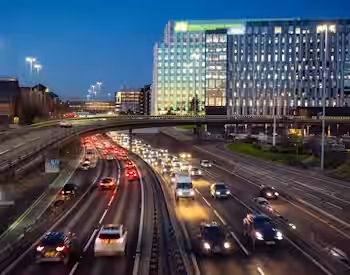Catastrophic smart motorway collision: Sanjay's remarkable story 5,000 miles away
Sanjay was involved in a serious road traffic collision while studying in the UK. He and a group of university friends were travelling home from a sports tournament when their car broke down on a busy stretch of a smart motorway.

One student was killed and three sustained catastrophic injuries, including Sanjay, who suffered a severe traumatic brain injury and multiple orthopaedic injuries.
Sanjay was airlifted to hospital where he underwent emergency surgery to remove part of his skull to relieve pressure on his brain. He was then placed on life support. Once he was stable, Fieldfisher moved him to the specialist private Neuro-rehabilitation Unit at the Wellington Hospital. Sanjay spent more than a year there receiving treatment and daily therapy from the multi-disciplinary team, specialising in brain injury.
Return to India
Sanjay had been in the UK to study for his Master's and always planned to return to India to work for his family's business. He returned to India for a break while the UK was going through strict lockdowns. Due to the pandemic and on-going issues, his return to India became more permanent.
In India, Sanjay's family enlisted 24-hour care for him including a physio at home five days a week. Sanjay also attended a neuro-rehabilitation centre three hours a day, six days a week.
The ethos of the personal injury team is to be very involved with our clients' rehabilitation. We visit people in hospital, regularly liaise with their case manager, receive regular clinic notes and reports and we attend multi-disciplinary meetings with their team - medical and therapeutic. Knowing exactly what is happening in our clients' treatment and rehabilitation means we understand what they need, how much funding is required and are ultimately able to justify the interim payments sought on their behalf.
While Sanjay was in India, the close relationship between the treating team and the legal team fell away. Despite requesting notes and reports, very little was forthcoming and it was impossible to foster a relationship with those treating him more than 5,000 miles away, and where serious injury claims are not litigated in the same way as the UK.
Visiting India
The solution to bridging this gap and understanding Sanjay's current situation was to visit him. Jill Greenfield and I visited Sanjay at his home in India, spoke with his family, carers and rehab team, and took detailed witness statements. We visited the neuro-rehabilitation centre where he spent 18 hours a week, and observed a session.
The ongoing impact of Sanjay's brain injury is substantial. He has significant memory and concentration issues and the damage to his brain affects the physical function through the right side of his body. He has issues with balance and an altered gait, often requiring a walking aid. Stairs and steps are dangerous for Sanjay.
When we visited, Sanjay was living in an apartment with his family. The apartment had stairs and Sanjay's bedroom was upstairs. Although for two years he had been having more than four hours of physiotherapy most days, unfortunately his progress had plateaued some time ago. It was clear that he required intensive multi-disciplinary, neuro-focussed rehabilitation, and alternative, accessible accommodation.
We also needed to understand two important issues regarding Sanjay's damages: who would be responsible for managing his finances, since he lacked the capacity, and would tax be payable in India on personal injury damages paid to him.
It became clear that for Sanjay to get the right rehabilitation, he would need to return to the UK for several months and benefit from an extensive multi-disciplinary team. This team would not just focus on (neuro) physiotherapy, but also neuropsychology, neuro speech and language and neuro occupational therapy (to assist in providing strategies to manage on-going issues and improve independence).
Sanjay returned to the UK within weeks. We secured suitable accommodation for him and his family, put in place suitable and experienced rehab team and carers. Neurology consultations and scans were booked for his arrival.
Sanjay's stay was initially scheduled for six months, but as he has progressed, he and his family have extended his stay, advised by his team. This extension will also include an independent living trial, unimaginable when we visited the family in India.
Accommodation
Sanjay's family apartment was not suitable for his needs. First, the condition of the footpaths and roads was not suitable for someone with Sanjay's disabilities. He also needs to live within a Jain community.
Working with Sanjay's brother, we found a new, incomplete development with several accessible properties. We began talks with the developers and contacted local lawyers to help with property purchase in India. When we returned to London, we commissioned a report on the suitability of the property to be used as evidence to persuade the Court of the need to purchase the property so that Sanjay could live as independently as possible.
Guardianship and Tax
Since Sanjay is resident in India, the English Courts have no jurisdiction as to how his damages are managed once they are transferred to India. Although the English Courts have no jurisdiction in India, Sanjay's litigation is taking place in the English Courts since his injury occurred in England, meaning the English Courts must be satisfied with any arrangement before any settlement or payment of final damages is approved.
Again, we found reputable local lawyers to help. Professional deputies are not commonplace in India and we are working collaboratively with the Indian lawyers and Sanjay's family to find an acceptable solution that the English Court will approve.
Finally, in the UK damages paid in respect of personal injury claims are tax-free, but not in other countries. The situation was not clear in India, and Sanjay had received conflicting advice. Knowing the tax situation is crucial so that we can accurately quantify Sanjay's claim, if any tax is payable, it can be claimed as part of the damages.
Read more about our road traffic claims and hear from clients.

